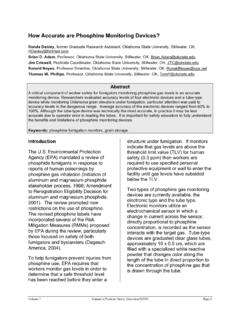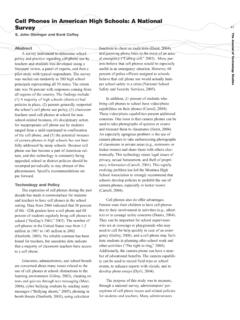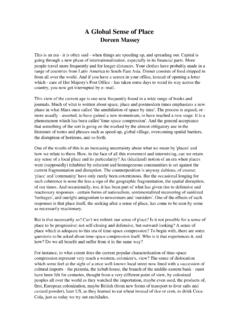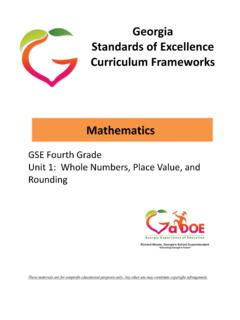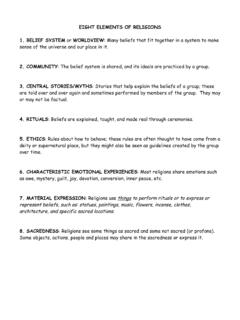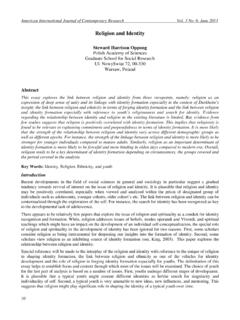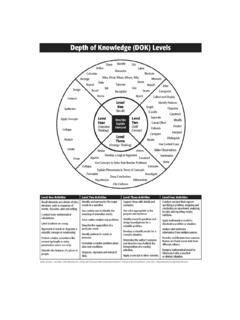Transcription of The Role of Experience in Learning: Giving Meaning and ...
1 Journal of Technology EducationVol. 11 No. 2, Spring 2000-23-The Role of Experience in Learning: Giving Meaning and Authenticityto the Learning Process in SchoolsRonald E. HansenRecent studies of technological education teachers in Germany, England,and Canada indicate that the socialization process these teachers undergo whileadjusting to the profession is a difficult one (Hansen, 1998). Among otherthings, the adjustment is complicated by a preference for learning which is outof harmony with the teaching and learning strategies employed by teachers fromother subject areas in the secondary school curriculum. The preconceptions andtendencies these technology teachers bring to the profession reveals a strongbias towards Experience as a framework for learning. In Ontario, Canada,technology teachers are required to have a minimum of five years workexperience in their technological specialization before qualifying for teachereducation. Most of these teacher candidates entering the profession have ten totwelve years of such Experience .
2 They have already been socialized into abusiness and industry culture which preaches the virtues of Experience over rotelearning. Meanwhile the Ontario secondary schools in which these technologyteachers work tend to devalue courses with experiential learning purpose of this manuscript is to explicate what constitutes anexperiential frame of reference for learning, for these adult professionals and forpeople generally. How effective is learning when actions, project work, andpersonal Experience (the non-discursive world) transcend or precede signs andsymbols (the discursive world)? What are the benefits to students? What can belearned from technology teachers about the value of Experience ? What are theimplications of this way of learning for the secondary school system and thecurriculum as we know it?The Nature of Experiential Learning Understanding how people learn is something that has both propelled anddetained education scholarship at the same time. For decades, educationalpsychologists have studied the learning process.
3 They concluded that learning isequated to a change in behavior. Beyond this important conviction, very littleconsensus about what characterizes the learning process exists and there is nocommon understanding. Dewey s essays are often credited with most closelydefining the learning process among youth. Yet his writings are not considered_____Ronald E. Hansen is a Professor in the Faculty of Education atthe University of Western Ontario, of Technology EducationVol. 11 No. 2, Spring 2000-24-definitive. It is amusing and perplexing that the state of scholarship in educationassociated with understanding how people learn is so undistinguished. What isso illusive about this phenomenon? What is it about the phenomenon or thescholarship that serves it which makes the concept a difficult one to describesuccinctly? Boud s (1989) work [cited in Weil & McGill] places the learningprocess into a broader perspective. His views may represent a fresh startingpoint for re-casting or re-framing how educators, especially technologyeducators, think about experiential, or Experience -based learning can be regarded as theearliest approach to learning for the human race, the significance and potentialof it has not been fully recognized until relatively recently.
4 In the formaleducation system it has tended to be developed and regarded as somehowfundamentally inferior to those organized forms of knowledge which havebeen constructed as subjects or disciplines. The practical and the applied donot tend to have the same status in educational institutions as the academicand the abstract. (p. xi)Interestingly, scholars from outside of youth education often have a moresanguine contribution to make in defining how people learn. Adult educationscholars (Chickering, 1977; Jarvis, 1987; Keeton, 1976; Kolb, 1993; Merriam &Clark, 1993; Rogers, 1951), for example, have found it constructive to documentthe learning process for adults as experiential. What these authors do is providealternative ways of looking at the question of how people learn, resulting in aproductive view of the learning process among humans, both young and old,about which there is a reasonable degree of consensus. Kolb (1984) argued that defining learning in terms of the change inbehavior is limiting and it poorly characterizes the learning process.
5 Kolbdefined learning as a human adaptation process. It is a process wherebyknowledge is created through the transformation of Experience (p. 38). He citedLewin s (1951) work as the empirical evidence for supporting a learning cycletheory that begins with the experiences of the learner. Lewin s formula forlearning describes human behavior as a function of a person and theenvironment [B=f(p, E)]. Learning takes place, according to Lewin, when alearner (person) interacts with, or is stimulated by, an environment. Others adoptthe same human adaptation process explanation for learning, but cast it indifferent ways. Jarvis (1987), for example, put it this way: ..there is nomeaning in a given situation until we relate our own experiences to it (p. 164). Experience plays a key role in the process. Rogers has been quite outspokenabout the learning process, especially the role of a teacher in that process. Hebelieves no one learns anything of significance from someone else. Instead,learning takes place when a learner is intrinsically motivated to learn andundertakes to learn something on his/her own.
6 This sentiment is echoed byAlbert Einstein who was quoted as saying: I never teach my pupils; I onlyattempt to provide the conditions in which they can learn [cited in Walter &Marks, 1981, p. 1]. In short, there appears to be more clarity and convictionJournal of Technology EducationVol. 11 No. 2, Spring 2000-25-about what constitutes learning among people outside of the formal educationfield than in reach their conclusions about how people learn, these scholars makereference to quantitative and qualitative studies with human subjects. Theyfollow the canons of science to clarify and verify what they believe to be true. Acontrasting method for exploring the learning phenomenon is to trust in one sown Experience . Beginning with Boud s broader perspective of how peoplelearn, the following analysis attempts to do this from first principles. Itrepresents an attempt to trust Experience in apposition to, or in contrast with, therules of scientific inquiry. The remainder of the paper draws on two morepragmatic forms of inquiry for its analysis.
7 Following a review of some recentliterature on what constitutes learning, conceptual analysis and comparativeanalysis will be used to explicate the essence of experiential As An Active Versus Passive Process Traditional pedagogy tends to assume the acquisition of knowledge andunderstanding by the mind is a passive exercise. Psychological research andtheory perpetuates this tradition by dividing the person into body and mind, intoactive and passive processes. Insufficient attention is paid to combinations ofthese categories. The result is a gap between what Experience tells us about howwe learn and what the experts tell us. Thought and action tend to have beenseparated, thinking and understanding to have been seen as abstract and general,therefore as teachable in abstract isolation from practical Experience . In contrast,practical competence has often been spoken of as though it were just a matter ofdoing; skill is then taken to mean a combination of thoughtless behaviour habits,inculcatable through simple practice (Tomlinson & Kilner, 1992).
8 Themomentum associated with this view is so deeply imbedded in teacher educationmethods and curriculum that it has seldom been challenged, until recently and Gillett (1994) in a book entitled The Discursive Mind challengedthe prevailing view of how people retain what they learn. In a chapter entitled, The Discursive Origins of the Sense of Self, the authors suggested thatlearning a language, , learning signs and symbols, does not give humanbeings a sense of physical location. It is the learning of perceptual and motorskills that is responsible for that (p. 111). Human beings, they suggest, live intwo worlds:One world is essentially discursive in character, that is, it is a world of signsand symbols subject to normative constraints. [The second is the material orphysical world]. There are two main kinds of skills that are often broughtinto play together and in complementary ways [within these two worlds].There are manual skills, those we use to manipulate material stuff, and thereare discursive skills, those we use in our symbolic interactions.
9 The world ofsymbols is organized by the norms and conventions of correct symbol other world in which we live, the physical or material world, isstructured by causal processes. Our language is our main means forJournal of Technology EducationVol. 11 No. 2, Spring 2000-26-managing in the world of symbols, our hands and brains are in the materialworld. (pp. 99-100)This analysis may help explain the experiential frame of reference preferredby technological education teachers. These teachers have lived and workedextensively in the material world developing their problem solving and manualskills. They often become socialized into a way of learning that is different fromthat used in the schools. In some respects learning and practicing technology aresynonymous activities to them. Human development in its fullest sense (abalance of the two worlds Harre and Gillett describe) requires that people learnto function effectively in the discursive world but as a complement to thematerial world, rather than in opposition to it or apart from it.
10 These technologyteachers may, in fact, be applying a learning methodology which has impli-cations for understanding how people learn but which is overlooked in theeducational ramifications of this observation are amusing and perplexing at thesame time. What would a curriculum which blends the discursive and non-discursive worlds look like? The sense of self that Harre and Gillett describedbrings the role of the teacher and the role of Experience in learning into clearerfocus. Their position that the sense of self and learning/development are unifiedthrough Experience is intriguing:The discursive thesis is that to Experience oneself as having a location in amanifold of places and in relation to others is a necessary condition for beingable to use and to understand indexical expressions. How does it come aboutthat these senses of unique location are the salient features of selfhood? Wedo not believe that learning a language is what is responsible for our havingthe sense of physical location.
